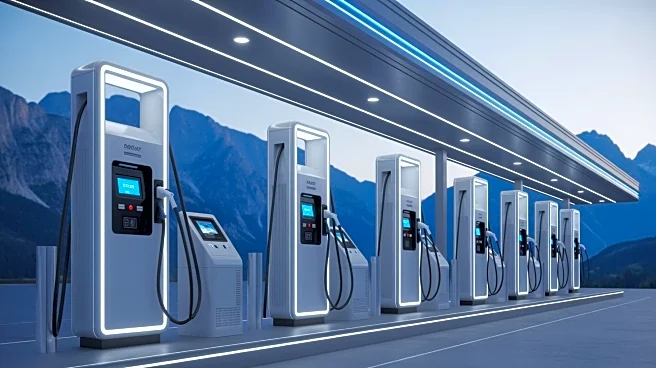What's Happening?
The state of Colorado has secured the final $12 million of a $56.5 million federal grant to expand its electric vehicle (EV) charging infrastructure. This funding, part of the National Electric Vehicle
Infrastructure grant program, will be used to install approximately 100 new fast public EV charging ports in strategic locations across the state. Colorado Governor Polis emphasized the state's commitment to becoming a leader in electric vehicle adoption, noting that over 80% of Colorado's highway system is now within 30 miles of a fast-charging station. The state already boasts over 5,000 Level 2 charging ports and more than 1,400 fast-charging ports. The expansion is designed to support both the growing number of EVs in the state, which exceeds 200,000, and the tourism industry, with charging stations planned for scenic byways and recreational areas.
Why It's Important?
The expansion of EV charging infrastructure in Colorado is a significant step towards reducing the state's carbon footprint and promoting sustainable transportation. By increasing the availability of fast-charging stations, the state is making it more convenient for residents and tourists to use electric vehicles, which can lead to reduced emissions and improved air quality. This initiative aligns with broader national goals to increase the number of public EV chargers, as envisioned by former President Biden. The development also highlights the ability of states to independently advance sustainable transportation solutions, potentially setting a precedent for other states to follow. The increased infrastructure could also stimulate economic growth by attracting more tourists and encouraging local businesses to invest in EV-friendly services.
What's Next?
As Colorado continues to expand its EV charging network, the state may see increased adoption of electric vehicles, further reducing reliance on fossil fuels. The success of this initiative could encourage other states to pursue similar projects, potentially leading to a nationwide increase in EV infrastructure. Stakeholders, including local businesses and environmental groups, are likely to support these developments, while the fossil fuel industry may face challenges as demand for gasoline and diesel decreases. The state will need to ensure that the new infrastructure is maintained and accessible to all users, potentially leading to further investments in technology and workforce training.
Beyond the Headlines
The expansion of EV charging infrastructure in Colorado could have long-term cultural and economic impacts. As more people transition to electric vehicles, there may be a shift in consumer behavior and attitudes towards sustainable transportation. This could lead to increased public support for environmental policies and further investments in renewable energy. Additionally, the development of EV infrastructure may drive innovation in related industries, such as battery technology and renewable energy sources, contributing to broader economic growth and job creation.











